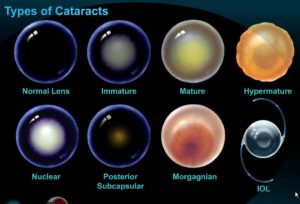Do you have problems seeing at night? Millions of Americans do. You may just need glasses, especially if you’re nearsighted. On the other hand, it could mean that you have cataracts or other issues. If you’re afraid to drive or go out after dark because you can’t see, let your doctor know.
What Causes It?
A wide variety of conditions, from drugs, to sun exposure to diabetes, makes it hard to see at night:
 Cataracts . The eye’s lens is right behind the pupil. As you age, cells grow and die inside it, causing it to thicken. That also builds up debris and leads to cataracts. They don’t hurt, but they do get worse and slowly cloud your lens. The first symptom is often poor night vision. Because cataracts distort the light that comes into your eyes, you may see halos around lights again, mostly at night. Hazy vision is also common.
Cataracts . The eye’s lens is right behind the pupil. As you age, cells grow and die inside it, causing it to thicken. That also builds up debris and leads to cataracts. They don’t hurt, but they do get worse and slowly cloud your lens. The first symptom is often poor night vision. Because cataracts distort the light that comes into your eyes, you may see halos around lights again, mostly at night. Hazy vision is also common.
Lack of vitamin A. It’s found in carrots and leafy vegetables. It helps keep the retina, the back of your eye where images are focused, healthy. Most Americans get enough vitamin A in their diet, but if you have a gastro-intestinal health issue that makes it hard for you to absorb nutrients (Crohn’s disease, celiac disease, gastric bypass) or if you smoke, you might have night vision problems.
Zinc. Without enough zinc, Vitamin A may not function as well as it should. The result may be night blindness. Beef, poultry, beans, and nuts are rich sources. Most people in the U.S. get plenty of it from their food.
Retinitis pigmentosa. This rare genetic disorder affects young people, usually before age 30. A decline in night vision is often the earliest symptom. Some people lose all their sight. Others keep some vision, but night vision is very poor regardless.
Medications. A number of medicines, including Viagra, can cause difficulty seeing in low light conditions.
Sunlight exposure. If you think your night vision is worse after a trip to the beach, you’re probably right. Sustained bright sunlight can worsen night vision for up to two days. Always wear your UV blocking sunglasses to avoid this.
Diabetes. It makes you more likely to have night vision problems. Over years, high blood sugar damages the blood vessels and nerves in your eyes, which leads to a condition called retinopathy. If you are diabetic and have trouble seeing in low light, either indoors or outside, talk to your eye doctor.
How Is It Evaluated?
A complete eye exam and history at an eye doctor’s office can help identify the cause of night blindness. The doctor will exam the front structures of the eyes, then use drops to dilate your pupils, then exam the back of your eyes with a slit-lamp, a bio-microscope with a bright light attached.
How Is It Treated?
Treatment for night blindness depends on the cause.
Cataracts are often removed surgically. The eye surgeon will replace the cloudy natural lens with a clear artificial model known as an intraocular lens. Most people have much better vision afterward, but some still need glasses.
Diabetic retinopathy is easy to prevent if you keep tight control of blood sugar levels with medicines and diet. One treatment uses a laser to destroy the tiny blood vessels that threaten your vision. This process, called panretinal photocoagulation, will preserve your overall sight but could reduce your night vision.
Lack of vitamin A or zinc aren’t common causes of night blindness. But it won’t hurt to eat foods rich in these nutrients if you have trouble seeing at night.
Comments are closed